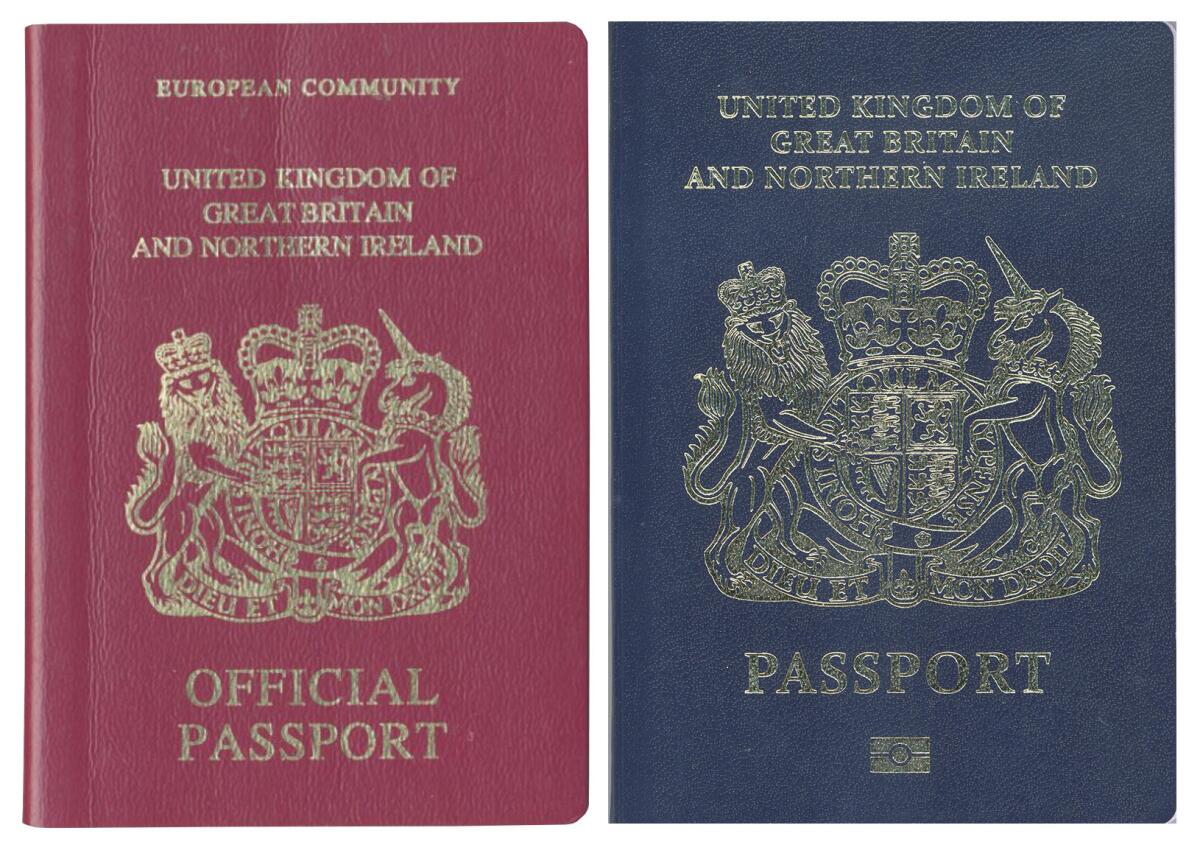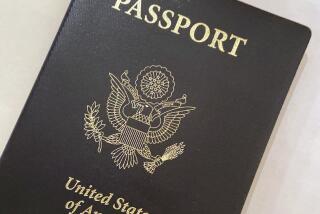Britain’s new, blue post-’Brexit’ passport may be made by a European company, and some detractors are seeing red

- Share via
The idea that a Franco-Dutch company would make Britain’s new, blue passport for use after the U.K.’s exit from the European Union has triggered a mix of outrage, bemusement and ridicule.
Some Britons on social media suggested Prime Minister Theresa May should step down. A few, or perhaps more than a few, worried Britain looked like “a laughingstock.” No doubt, some were insulted.
“If correct this is either an extremely bad joke or it shows the total contempt the government & civil service has for the 17.4m who voted leave,” tweeted Henry Bolton, a British politician and a former leader of the UK Independence Party.
Bolton was among those who referenced the June 2016 referendum in which 52% of voters favored leaving the 28-nation European Union, a move known as Brexit.
“Taking back control. But not, apparently, the ability to print our own passports,” tweeted Diane Abbott, a member of Parliament and shadow Home secretary.
Joyce Miller, a Twitter user with the handle @agapanthus49, called the apparent decision to award the passport contract to a non-British company “a national disgrace.”
The digital security company, Gemalto, which has dual listing on the Amsterdam and Paris stock exchanges, appears to have beaten out other competitors for the job, according to several British media outlets. The British firm with a French name De La Rue, which currently holds the contract for producing United Kingdom passports, apparently has been left out in the cold.
The British Home Office, which is responsible for immigration, security and law and order, did not confirm the name or nationality of the company that has secured the contract, but said in a statement Thursday that “the preferred bidder has been selected following a rigorous, fair and open competition” and all bidders had been notified of the outcome.
“The chosen company demonstrated that they will be best able to meet the needs of our passport service with a high quality and secure product at the best value for money for our customers and the taxpayer,” the government statement said.
Britain has not required passports to be manufactured in the U.K. since 2009 and a proportion of passports had been made overseas since then, “with up to 20% of blank passport books currently produced in Europe with no security or operational concerns,” the government said.
It noted that “the quality of the passport was prioritized over cost when examining the bids,” and two new U.K. factories were expected to create up to 70 jobs as a result of the passport production.
The contract is worth 490 million British pounds, the equivalent of $691.5 million, over 10 years. Sources told the Telegraph newspaper that Gemalto was “close to signing the contract after undercutting rivals, including a British firm, by around £50 million,” or about $70.5 million, the paper reported Wednesday.
Gemalto spokeswoman Sophie Dombres said in a statement that the passport process was ongoing and since “the terms of engagement are confidential,” the company was unable to “further comment on it at this stage.”
But De La Rue said in a statement that a French company had been awarded the contract to manufacture the passport, and acknowledged that De La Rue was “deeply disappointed” by the decision.
“This shows a serious lack of commitment to British business from the U.K. government,” the statement said. “We have a strong track record producing the U.K. passport for the last nine years here in the U.K., by hundreds of our highly skilled staff … making a direct contribution to their regional economies.”
The statement said that De La Rue was confident that its bid would “deliver value for money for the government and the British taxpayer, in terms of world leading security features and iconic British design, as well as to the wider U.K. economy.”
“This would be a British passport, made in Britain, by a British company, so if this symbol of national identity were to be awarded to a French company it would be a huge blow, particularly at a time when Britain is seeking to establish its future after we leave the EU,” the statement said.
Britain is in negotiations to leave the EU by March 29, 2019.
According to a timeline published by the British Home Office, the first modern-style British passports, including a photograph and signature, were issued in 1915.
“They were made of a single piece of paper that folded out and sat between cardboard covers,” the government said. The first blue passport in the format of a book was issued in 1921. It had 32 pages and was written in French. The passport’s color changed to burgundy in 1988 to conform to the color of all passports issued by nations of the European Economic Community, which predated the EU and which Britain had joined 15 years earlier.
The new passport, which will revert to blue, will be phased in beginning October 2019, officials said.
When announcing the reintroduction of the blue passport, May tweeted that “the UK passport is an expression of our independence and sovereignty – symbolising our citizenship of a proud, great nation. That’s why we have announced that the iconic #bluepassport will return after we leave the European Union in 2019.”
That may be all well and good, but some in the U.K. are not ready to give up the notion that the travel documents ought to be manufactured on British soil.
Len McCluskey, general secretary of Unite the Union, Britain’s biggest trade union with 1.42 million members, tweeted that his organization had launched a campaign with the Daily Mirror newspaper “to demand the new blue U.K. passport is made in Britain.” He called on Twitter followers to join the fight to support British businesses.
As it turns out, some Britons slammed the uproar as being much ado about nothing and criticized complainers for failing to get their priorities right.
“Who actually cares?” tweeted Charlie Hession, described in his Twitter profile as a 22-year-old medical student, Londoner and proud moderate Tory. “I’d much rather the government spent the £50 million saved on the [National Health Service] and the homeless.”
For more on global development news, see our Global Development Watch page, and follow me @AMSimmons1 on Twitter
More to Read
Sign up for Essential California
The most important California stories and recommendations in your inbox every morning.
You may occasionally receive promotional content from the Los Angeles Times.










